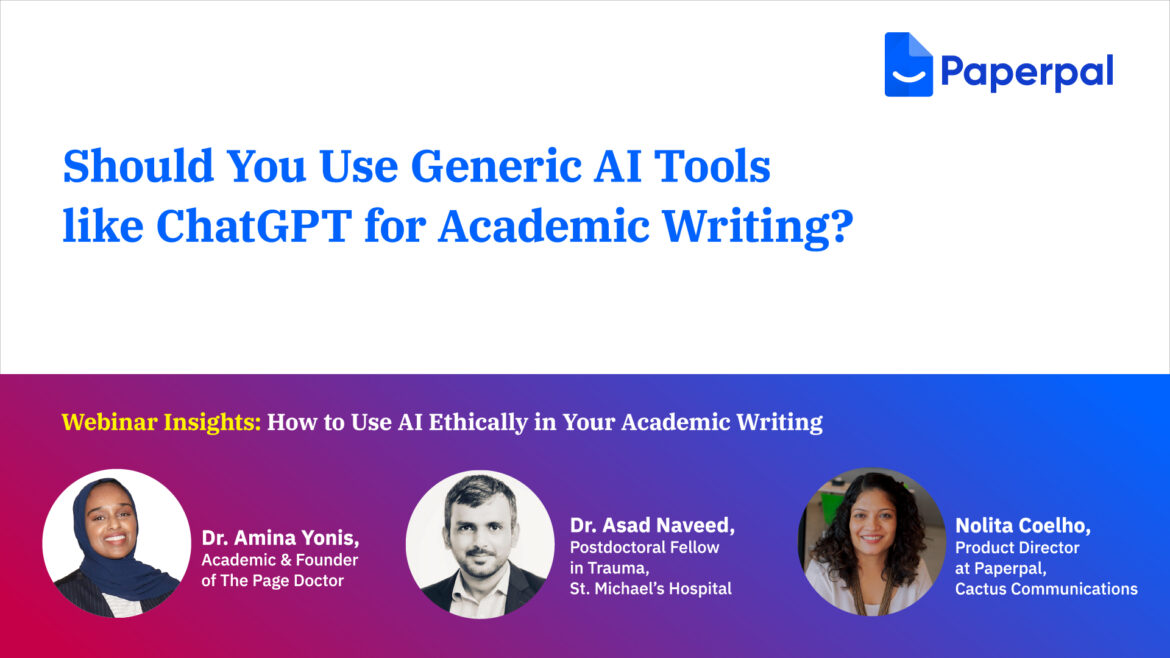AI has transformed academic writing for good. Generative AI tools like ChatGPT, Bard, and Claude have become increasingly popular due to their accessibility and versatility, from generating text to providing research assistance, making them valuable assets for students and researchers alike.
However, are these general-purpose AI writing tools trained enough for academic writing? In this blog, we explore the limitations of general-purpose AI tools like ChatGPT for academic writing and provide you with an academic-focused AI writing tool that can help you write twice as fast.
Table of Contents
- What are general purpose generative AI tools?
- Limitations of generic AI tools like ChatGPT for academic writing
- How is Paperpal different from general purpose AI tools?
- Ethical considerations in using tools like ChatGPT for academic writing
What are general purpose generative AI tools?
“General Purpose GenAI tools” refer to artificial intelligence (AI) tools that are designed to perform a wide range of tasks across various domains. These tools are typically versatile and adaptable, capable of being applied to different problems and scenarios. They are not tailored to a specific industry or use case but rather designed to be flexible and broadly applicable. Examples of such tools include ChatGPT, Bard, and Claude, among others.
Watch Experts Speak about the Limitations of Using ChatGPT for Academic Writing
Limitations of generic AI tools like ChatGPT for academic writing
General Purpose GenAI tools such as ChatGPT, Bard, and Claude exhibit a tendency for hallucination due to their predictive text nature. Operating on Large Language Models (LLMs), they possess broad versatility, capable of generating diverse content types like text, images, code, and audio. Their predictive algorithms drive output generation from input data. However, this adaptability can lead to inaccuracies, notably in contexts where precision matters, such as scholarly content.
General purpose AI writing tools may generate text that includes made-up or incorrectly quoted references, which can be problematic in academic or research settings where precision and factual accuracy are paramount. While these tools excel in creative writing or fictional content generation, their tendency for hallucination can be a drawback for scholarly content where accuracy is important
The challenges with general-purpose AI tools stem from several factors. Some of them are:
Dependency on Prompts
A lot of the general-purpose tools often rely heavily on the input provided, typically in the form of prompts. However, using single-line prompts can result in poor outputs. Therefore, users need to navigate a steep learning curve and develop prompt expertise to extract the best results.
Limited Contextual Understanding
While general-purpose AI tools aim to be versatile, they often lack deep contextual understanding, especially in specific domains or fields. Even with the emergence of fine-tuned models like GPT agents, which can be tailored to certain tasks, achieving contextual understanding still requires expertise and extensive training data. In specialized fields like environmental science, where precise terminology and context are crucial, these tools may struggle to provide accurate outputs.
Data Security Concerns
Data security poses a significant concern. General-purpose AI models rely on large datasets for training, but in academic settings, sharing certain data may be prohibited as these datasets often contain sensitive information. Thus, users must exercise caution regarding the content they input into these tools to avoid potential breaches of data security policies.
How is Paperpal different from general purpose AI tools?
Paperpal draws on 21+ years of experience in providing human editing services to support authors in getting published. By mechanizing the expertise gained over the years, Paperpal mimics the editing process conducted by human editors, ensuring high-quality outputs.
Here’s how Paperpal differs from ChatGPT for academic writing by providing accurate, niche-specific writing support:
LLM Technology
Paperpal offers real-time AI writing support tailored specifically for academic use. It takes broad-based language model (LLM) technologies and incorporates it with specialized training to cater to the unique needs of academic writing.
Built-In Academic Prompts
In contrast to the extensive prompt writing prompts required by general-purpose tools, Paperpal simplifies the process by providing an objective form where users input select information. The prompts are fine-tuned in the backend to generate outputs tailored to the user’s requirements, whether it’s crafting an outline, composing a methods section, or drafting a cover letter or email.
Data Security
Paperpal is mindfully designed with a keen understanding of the academic industry and domain-specific requirements. Unlike general-purpose tools that rely on data to train their models, Paperpal does not use user data for training its AI models. This approach allows users to have greater control over their data, ensuring data security and confidentiality.
Ethical considerations in using tools like ChatGPT for academic writing
When using AI for academic writing, it’s essential to adhere to guidelines set by journals, universities, or other relevant entities. Incorporating their suggestions into your work ensures ethical and responsible AI usage. By incorporating these ethical considerations into our work, we can navigate the use of AI responsibly and ethically.
Ultimately, researchers must weigh the benefits, limitations, and ethical implications before integrating AI tools into their academic work, ensuring that they enhance rather than compromise the integrity of their research. Embracing AI tools can indeed be transformative, but it requires a mindful approach.
Paperpal is a comprehensive AI writing toolkit that helps students and researchers achieve 2x the writing in half the time. It leverages 21+ years of STM experience and insights from millions of research articles to provide in-depth academic writing, language editing, and submission readiness support to help you write better, faster.
Get accurate academic translations, rewriting support, grammar checks, vocabulary suggestions, and generative AI assistance that delivers human precision at machine speed. Try for free or upgrade to Paperpal Prime starting at US$19 a month to access premium features, including consistency, plagiarism, and 30+ submission readiness checks to help you succeed.
Experience the future of academic writing – Sign up to Paperpal and start writing for free!
Image by Freepik



